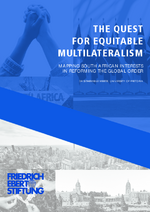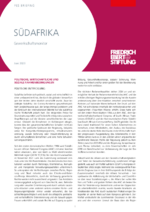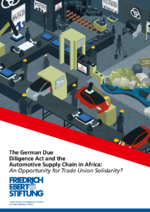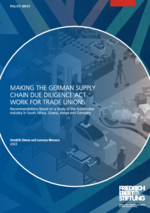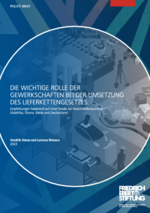South Africa
As a member of the G20 and the wider BRICS state group, South Africa plays a key role in North-South relations and, despite recent differences over Russia's war of aggression against Ukraine and the Middle East conflict, is an important partner for Germany and Europe in their commitment to democracy, human rights and a rules-based world order. Domestically, the country faces enormous challenges, with extremely high levels of inequality and unemployment, as well as inadequate public services, particularly in energy supply. The state's capacity to respond to the socio-economic crisis is severely limited due to escalating corruption and mismanagement under President Zuma (2009-2018). The African National Congress (ANC), which has been in power since the first free elections in 1994, is struggling to overcome these problems and bring about its own much-needed renewal. In view of the consequences of state capture and the deep socio-economic crisis, not only is support for the ANC dwindling, but also confidence in democracy in general.
In this context, the FES in South Africa is working with allies within the ANC, with trade unions, with activists (particularly young people) outside of political parties and with progressive think tanks on three main areas:
1) Renewal and political participation: Support for civic engagement, including outside of political parties, particularly among young people; dialogue on feminist renewal, ANC and trade union renewal and political culture for successful coalition governments; support for organizing and trade union representation of precarious workers.
2) Progressive economic and social policy: in particular research and campaigning on basic social protection and support for trade unions in shaping a socially just energy transition and comprehensive transformation.
3) The future of multilateralism and internationalism: broadening the debate on foreign policy, in particular involving young people and trade unions; promoting international dialogue between parties, trade unions and activists to strengthen progressive internationalism and developing a common agenda to reform and strengthen multilateralism.
To do this, the FES builds on trust that has developed over decades. Since the late 1970s, the FES has supported South African trade unions and the ANC office in exile in Bonn. Since the early 1990s, the FES has been represented by an office in South Africa and in 2022 opened the "Lindiwe Mabuza Space" on its campus as a new events venue.
Find out more about our work in South Africa on the national project website.
The FES Trade Union Competence Centre (TUCC) for Sub-Saharan Africa is also based in Johannesburg.
Publications
Mbete, Sithembile
The quest for equitable multilateralism
Johannesburg, 2024
Download (PDF) (19 MB, PDF-File)
The German due diligence act and the automotive supply chain in Africa
Johannesburg, 2023
Download (PDF) (28 MB, PDF-File)
Simon, Hendrik; Monaco, Lorenza
Making the German supply chain due diligence act work for trade unions
Johannesburg, 2023
Download (PDF) (4,4 MB PDF-File)
Simon, Hendrik; Monaco, Lorenza
Die wichtige Rolle der Gewerkschaften bei der Umsetzung des Lieferkettengesetzes
Johannesburg, 2023
Download (PDF) (4,5 MB PDF-File)
